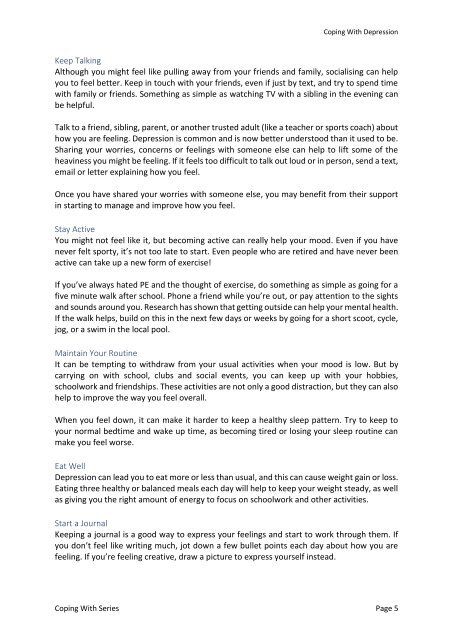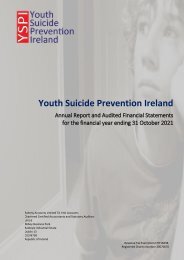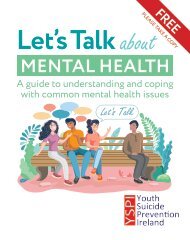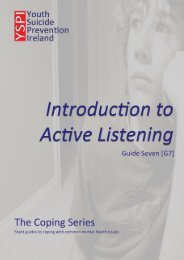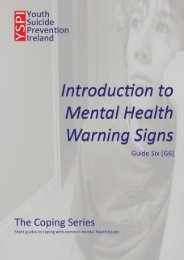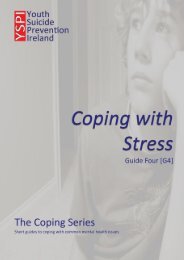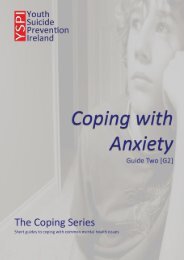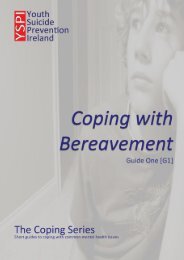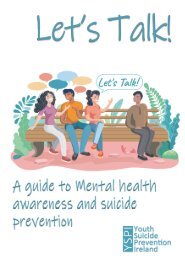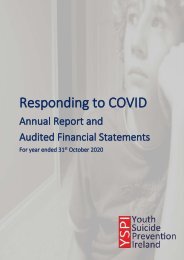CWSG3 - Coping with Depression
This guide is part of the Coping With Series. Each guide provides an introduction to the issue, signs and symptoms to be aware of, coping techniques and information on helping friends and family to cope.
This guide is part of the Coping With Series. Each guide provides an introduction to the issue, signs and symptoms to be aware of, coping techniques and information on helping friends and family to cope.
You also want an ePaper? Increase the reach of your titles
YUMPU automatically turns print PDFs into web optimized ePapers that Google loves.
<strong>Coping</strong> With <strong>Depression</strong><br />
Keep Talking<br />
Although you might feel like pulling away from your friends and family, socialising can help<br />
you to feel better. Keep in touch <strong>with</strong> your friends, even if just by text, and try to spend time<br />
<strong>with</strong> family or friends. Something as simple as watching TV <strong>with</strong> a sibling in the evening can<br />
be helpful.<br />
Talk to a friend, sibling, parent, or another trusted adult (like a teacher or sports coach) about<br />
how you are feeling. <strong>Depression</strong> is common and is now better understood than it used to be.<br />
Sharing your worries, concerns or feelings <strong>with</strong> someone else can help to lift some of the<br />
heaviness you might be feeling. If it feels too difficult to talk out loud or in person, send a text,<br />
email or letter explaining how you feel.<br />
Once you have shared your worries <strong>with</strong> someone else, you may benefit from their support<br />
in starting to manage and improve how you feel.<br />
Stay Active<br />
You might not feel like it, but becoming active can really help your mood. Even if you have<br />
never felt sporty, it’s not too late to start. Even people who are retired and have never been<br />
active can take up a new form of exercise!<br />
If you’ve always hated PE and the thought of exercise, do something as simple as going for a<br />
five minute walk after school. Phone a friend while you’re out, or pay attention to the sights<br />
and sounds around you. Research has shown that getting outside can help your mental health.<br />
If the walk helps, build on this in the next few days or weeks by going for a short scoot, cycle,<br />
jog, or a swim in the local pool.<br />
Maintain Your Routine<br />
It can be tempting to <strong>with</strong>draw from your usual activities when your mood is low. But by<br />
carrying on <strong>with</strong> school, clubs and social events, you can keep up <strong>with</strong> your hobbies,<br />
schoolwork and friendships. These activities are not only a good distraction, but they can also<br />
help to improve the way you feel overall.<br />
When you feel down, it can make it harder to keep a healthy sleep pattern. Try to keep to<br />
your normal bedtime and wake up time, as becoming tired or losing your sleep routine can<br />
make you feel worse.<br />
Eat Well<br />
<strong>Depression</strong> can lead you to eat more or less than usual, and this can cause weight gain or loss.<br />
Eating three healthy or balanced meals each day will help to keep your weight steady, as well<br />
as giving you the right amount of energy to focus on schoolwork and other activities.<br />
Start a Journal<br />
Keeping a journal is a good way to express your feelings and start to work through them. If<br />
you don’t feel like writing much, jot down a few bullet points each day about how you are<br />
feeling. If you’re feeling creative, draw a picture to express yourself instead.<br />
<strong>Coping</strong> With Series Page 5


